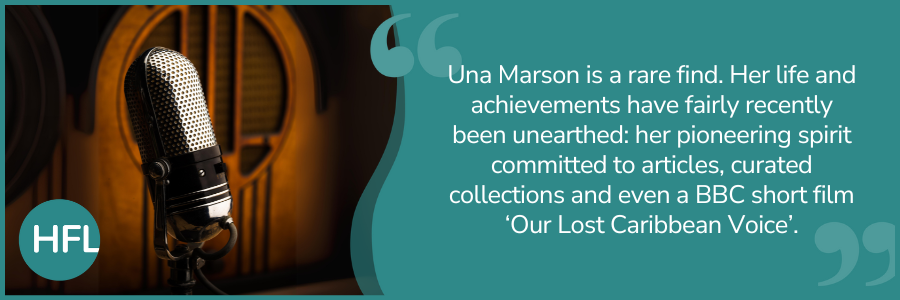
The Test
The test of true culture
Is the ability
To move among men,
East or West,
North of South,
With ease and confidence,
Radiating the pure light
Of a kindly humanity.
Una Marson is a rare find. Her life and achievements have only recently been unearthed: her pioneering spirit committed to articles, curated collections and even a BBC short film ‘Our Lost Caribbean Voice’. Her story is fitting for the BHM themes for both last year and the upcoming year - Celebrating Our Sisters and Reclaiming Narratives - because her trailblazing and determination are galvanising.
Una Marson was born in the parish of St Elizabeth Jamaica in 1905. She would eventually become a journalist, editor, playwright and poet. But that short biography does not demonstrate the extent of her achievements and talents. Whilst in Jamaica she started and then became Jamaica’s first female editor and publisher of The Cosmopolitan.
You could be forgiven for not having heard of Una Marson or for not being aware that she was the first black female broadcaster on the BBC in 1941. She featured on George Orwell’s 6-part poetry magazine Voice in 1942, which also featured TS Eliott in the December episode. Cleverly, Marson turned this opportunity into a BBC West Indian Service, Caribbean Voices where she was able to honour works from Sam Selvon, Edward Kamau Braithewaite and Vidia Naipaul. Her achievements have been languishing, somewhat buried in obscurity given her sudden passing aged 60 in 1965. Or perhaps her limited popularity is a reflection of her personal story which is interspersed with struggles with mental health, periods in mental institutions and a diagnosis of schizophrenia. But, it is in these aspects of her life that her fortitude and spirit lie.
Whilst much of Una’s writing is not easy to access, it is possible to read her poetry. In her lifetime she produced 3 volumes: Tropic Reveries (1930), Heights and Depths (1931) and The Moth and the Star (1937). These pages reveal her experiences as an immigrant to the UK, challenges and desires, determination to fulfil her potential and her willingness to address the cruelty of racism and the narrow gender stereotypes of England and Jamaica. In her poem ‘The Test’ she expresses a deep want for humanity and a deep need for every person to be able to move through the world unshackled and free.
Una’s story in lots of ways is not dissimilar to many activist immigrants of her era, it is no surprise that she worked alongside Dr Harold Moody or that she brushed shoulders with Paul Robeson. However, this would belie the struggles she navigated that existed at the time. This is something that Una addresses in her poem Kinky Hair Blues (1937) where she writes about the status quo regarding beauty, a world that doesn’t see her hair as attractive and the tension between standing out and fitting in. In this poem, she makes a choice that we have come to see as very modern; she uses a Jamaican dialect to recreate her voice, its cadence and rhythm. In choosing to write in her dialect, once again, Una is trailblazing, demonstrating a fearlessness and a resistive and restless spirit. Una demonstrates she can codeswitch and speak to different audiences, but this also reflects the tension of her existence. When broadcasting on the BBC on West Indies Calling (1944), her use of received pronunciation (RP) was faultless but the internal struggle in Marson showed, ‘There is conflict pressing in on her all the time.’
Selecting Una Marson for this blog was deliberate given that her story - until recently - had not seemed to exist to current generations. She possessed so much activism and courage. She was passionate about female equality and liberation. She took to the stage to give speeches on race and class, was an articulate black female activist, was the first Jamaican woman to edit and publish a magazine and she believed in female employment and financial freedom. Marson espoused views not commonly associated with women like her and usually perceived to be part of a post-war civil rights movement. In reality, Marson existed as an influential feminist figure prior to the Windrush period which we so often wrongly perceive as the moment of arrival from people of the Caribbean into the UK.
Una Marson’s story – like many others – is complex and she is far from a perfect heroine, but her struggles, bravery meant that her voice was heard. Whilst we may want to avoid both the stories of struggle or the superhero narratives when exploring the lives and contributions of racially minoritised people in the UK, it is important not to ignore the lives of those like Una Marson and the contributions they have made, particularly when their lives began with such uncertainty.
The dust that covered Una Marson’s legacy is slowly being removed. Her poems and plays, her life, her successes and her role in bringing the experiences of people from the Caribbean to a large audience are all slowly emerging and ready to be unpacked. Her story is at least in part, a triumphant stand against the limitations that others tried to impose.
Her voice was heard and it will be heard again.
If you would like support on race equity and how to embed anti-racism and inclusive practices in your school/setting/trust, you can find out more. or contact the Wellbeing team on email: wellbeing@hfleducation.org
Sources
www.bristol.ac.uk/history/public-engagement/blackhistory/snapshots2021/marson/
Jarrett-Macauley, The Life of Una Marson 1905 – 65 (Manchester University Press, 2010)



